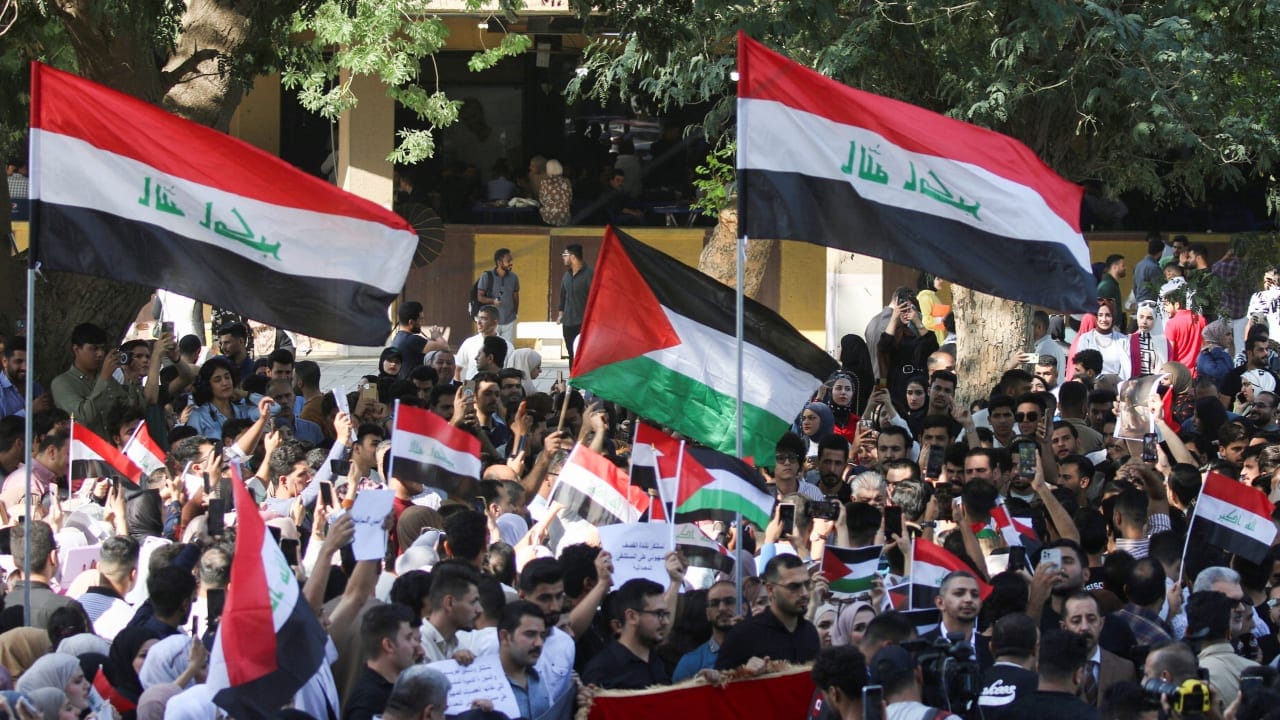Alwaght-The United Nations General Assembly that according to its statute was to be a place for peace and deterring the the security threats against the world countries once again has become a place for muscle flexing and threats of the Israeli Prime Minister Benjamin Netanyahu.
In his UNGA address, Netanyahu claimed that Israel has "deterred" the Iran-aligned Shiite forces in Iraq.
Netanyahu delivered his threat to Iraqi forces before a nearly empty UNGA hall, after a mass walkout by delegates protesting Israel's actions in Gaza.
As he began his address, a significant number of world leaders and diplomats left the room in a coordinated protest against Israeli genocide in Gaza. This move left the Israeli PM speaking to a largely vacant chamber.
In a swift response to Netanyahu's threats, Iraqi Foreign Minister Fuad Hussein firmly rejected the statements, calling them "unacceptable." He issued a stark warning, stating that "an attack on any Iraqi is an attack on all of Iraq."
Iraqi intelligence warnings
Iraqi parliamentary sources have disclosed that the country's intelligence and national security agencies have presented a comprehensive report to Prime Minister Mohammed Shia al-Sudani, warning that Iraq could be Israel's next military target, Iraqi sources familiar with the reports said.
According to these sources, Netanyahu is considering opening a new front in the region, with Iraq being the most likely candidate. The report clearly states that Israel now views Iraq as the central hub for Iran's regional activities following the loss of its military base in Syria. It adds that the continued strategic depth of resistance forces in Iraq has made the country a potential target for Israeli aggression.
Concurrently, the Iraqi government has announced practical steps to build a modern air defense system to enhance its ability to counter any potential violation of its airspace. However, achieving this goal appears to be out of reach for Iraq, at least in the short run.
Worthless agreement
Amid these developments, it is noteworthy to mention that Iraq has several security agreements with the US. Sihad al-Shammari, a political analyst close to the Iraqi government, told Al-Akhbar newspaper that Israeli threats against Iraq contradict the existing security agreement between Baghdad and Washington. This raises questions: Can the Iraqi-American security pact actually prevent an Israeli attack? If we look back just two months, the answer is likely no.
Less than two months ago, Qatar, one of US's closest non-NATO allies, was attacked by the Israeli regime. This strike occurred on the soil of a country that has built very close ties with Washington, hosts at least 11,000 American troops, dozens of American fighter jets, and advanced air defense systems at the Al Udeid Air Base as the largest US air force asset in the region.
The main question is: Was this massive American presence—over 100 fighter aircraft, an active joint air operations center controlling US air missions in West Asia, a regional coordination and monitoring center for US air operations, and a fleet that includes F-16s, F-15s, B-52 and B-1 bombers, stealth F-22s, RC-135 electronic reconnaissance planes, and various advanced US combat and surveillance drones—insufficient to protect Qatar from just 10 missiles launched by Israeli jets?
Notably, the Israeli jets had to fly a distance of 1,800 to 2,000 kilometers to reach Qatar, requiring mid-air refueling by KC-707 tankers. Channel 12 in Israel confirmed that this refueling took place, and once again, the footprint of American refueling tankers is visible. So, can the US truly evade responsibility for Israel's attack on Qatar?
Therefore, when the Americans did not prevent an Israeli attack on Qatar as their closest Arab ally, it is unlikely they will lift a finger to help Baghdad in the event of a potential Israeli strike on Iraq.
Israeli challenge to strike Baghdad
On the other side, targeting Iraq is not a piece of cake for the Israelis. If the Israelis limit their strike to the resistance groups or even if they launch a massive attack on Iraq, the reactions would not be confined to Iraq and possibly Yemen will launch further ballistic missiles in support of Iraq.
Iraq worried about another war on Iran
Beyond the unwelcome prospect of Iraq becoming an unwilling conduit for Israeli attacks against Iran, Iraq's own energy needs make it dependent on stability within Iran. Given that approximately one-third of Iraq's electricity is generated using Iran-supplied natural gas, any disruption to this supply risks triggering widespread blackouts and social unrest, further undermining the Baghdad government's position. So, Iraq is also deeply concerned about a potential Israeli attack on Iran and its widespread repercussions.
Despite its vast oil and gas reserves, decades of war, sanctions, and political instability have left Iraq with profound infrastructural challenges. Its dilapidated power grid, coupled with systemic mismanagement and corruption, means Iraqis already face daily electricity cuts. Currently, imported gas and electricity from Iran supply about a third of Iraq's energy requirements. This has left Iraq immediately vulnerable to any volatility originating from neighboring Iran.



























